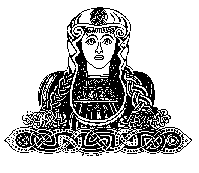ASK AINE


Dear Aine,
You have been there, and you have seen it all. Is Byzantium a "monotonous story of the intrigues of priests, eunuchs and women, of poisonings, of conspiracies, of uniform ingratitude, of perpetual fratricide"?
Dear Squeamish,
I am afraid that description fits every time and every place to some degree. The inhabitants of Asia Minor just have a Grand Passion for spectacular popular circuses, courtly intrigues (including Royal eye-gougings) and religious mysticism. (According to Philip Sherrard in Byzantium.) Actually Byzantium is a term those inhabitants never would use because, as Tamara Talbot Rice says in Everyday Life in Byzantium, they consider themselves citizens of the Roman Empire. The rise of the East as the predominant power had its culmination in Emperor Constatine's defeat of three rival 'Emperors' in 324. Emperor Constantine relied on the help of visions to defeat rivals, opt for Christianity, and to found a 'New Rome" on the site of a small trading town in Asia Minor.
Let us consider your catalog of crimes one at a time:
"Intrigues of priests" Christianity was a persecuted religion from the time of its founding. Emperor Constantine's conversion by "conquering in the Sign of the Cross" was the first official softening in organized martyrdom. Certainly through the influence of priests, monasteries bloomed like spring flowers.
"Intrigues of eunuchs" Many of the highest offices were held by and reserved for eunuchs. Patriarchs, commanders of armies and navies, doctors, and civil servants were eunuchs. The presence of eunuchs in the high ranks of Imperial service operated as a check on any tendency for power to fall into the hands of a hereditary nobility. Intrigue? What else were they going to do at night anyway?
"Intrigues of women" Just because there were women like 'Emperor' Irene who blinded her own son to become sole ruler, one cannot condemn people enlightened enough to honor women as rulers.
"Poisonings" Certainly one always had to maintain a 'food taster', but then I dare you to go unprepared to a meal with the Borgias. (Mmm, what is that new spice you are using in this dish?)
"Conspiracies" Diplomacy was the art by which you honor your neighbors with sumptuous gifts and lavish receptions but subsidize their enemies and incite them to attack.
"Uniform ingratitude" What about the ingratitude of the Russians who benefited from the civilization brought by missionaries from Byzantium and returned the favor by trying for 100 years to conquer the Empire?
"Perpetual fratricide" War was the history of mankind. But in between clashes of arms, the Eastern Empire systemized Roman Law and remained faithful to its Classical heritage and Christian precepts. It preserved the law, art, and learning of the Romans and Greeks for over a thousand years after the fall of Rome.
Aine du Bayonne sur l'Adour traveled East to see Emperor Manuel I and Empress Irene in Constantinople.
Jane Anne Carey has traveled East far enough to see the Green Isle of her forefathers and the British Museum, too.
Return to Home - Relative When